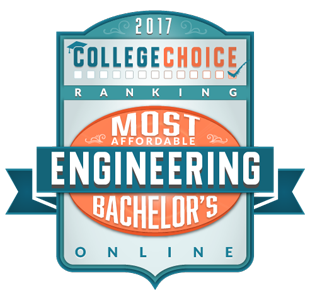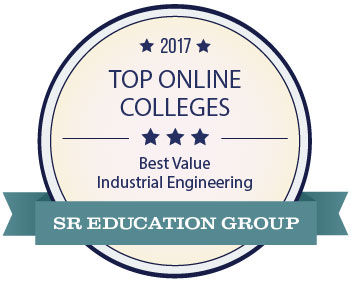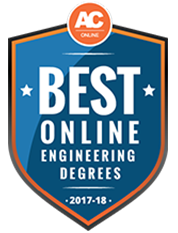Industrial Engineering Technology Bachelors Degree
Industrial Engineering Technology is concerned with the design, implementation and improvement of integrated processes and the resulting products or services within an organization. It draws upon specialized knowledge and skill in the mathematical, natural, physical, and social sciences together with the principles and methods of engineering analysis and design, to specify, predict, and evaluate the results to be obtained from such systems.
This degree offers graduates a challenging career in business, industry or government. Graduates deal primarily with the process management of money, materials, and labor in a business and industrial environment. The IET degree is offered both as hybrid and/or online. Online participants can attend class "virtually", meaning the student can attend class at a designated time/day through the Internet. Optionally, students can choose not to attend virtually and catch up through video lectures, recorded archives, and/or discussion groups. Kennesaw State University’s program is ranked 4th in the nation, based on student enrollment.
-
Program Educational Objectives
The Industrial Engineering Technology BS degree program of Kennesaw State University has a mission to provide undergraduate education in industrial engineering technology related fields to serve the manufacturing and service industries. The program prepares graduates for careers that are concerned with the design, implementation, evaluation and improvement of integrated systems of people, machines, energy, information and logistics. IET graduates are well prepared to lead the scientific and economic development of an increasingly complex state, nation and world. Additionally they have an appreciation for the impact that various political and social issues can have on their companies. Our mission is to serve both traditional and non-traditional students at the undergraduate and graduate levels and to empower them with the ability and vision to transform the future.
Within a few years after graduating, Industrial Engineering Technology students will:
- Operate in applied industrial engineering technology positions that require specialized knowledge and skills in areas including work measurement, data analytics, process and facilities design, quality and logistics.
- Fulfill leadership roles in solving problems, communicating effectively, and adapting to changes.
- Commit to lifelong learning and continued professional development.
-
Student Outcomes
Student outcomes describe the knowledge and skills acquired by students who complete the program. Students completing the Industrial Engineering Technology program will have:
- An ability to apply knowledge, techniques, skills and modern tools of mathematics, science, engineering, and technology to solve broadly-defined engineering problems appropriate to the discipline.
- An ability to design systems, components, or processes meeting specified needs for broadly-defined engineering problems appropriate to the discipline.
- An ability to apply written, oral, and graphical communication in broadly-defined technical and non-technical environments; and an ability to identify and use appropriate technical literature.
- An ability to conduct standard tests, measurements, and experiments and to analyze and interpret the results to improve processes.
- An ability to function effectively as a member as well as a leader on technical teams.
- An ability to accomplish the integration of systems using appropriate analytical, computational, and application practices and procedures.
- An ability to apply knowledge of probability, statistics, engineering economic analysis and cost control, and other technical sciences and specialties necessary in the field of industrial engineering technology.
-
Rankings
Curriculum
General Education (42 Credit Hours)
See listing of requirements in the KSU Catalog.
-
Specific General Education Requirements for this Major
Students must complete 8 Credit Hours for Area D2 and may choose from the following:
- PHYS 1111 and PHYS 1111L
- PHYS 1112 and PHYS 1112L
- PHYS 2211 and PHYS 2211L
- PHYS 2212 and PHYS 2212L
- CHEM 1211 and CHEM 1211L
- CHEM 1212 and CHEM 1212L
- BIOL 1107 and BIOL 1107L
- BIOL 1108 and BIOL 1108L
- MATH 1112 - College Trigonometry
or - MATH 1113 - Precalculus
- MATH 1190 - Calculus I
Lower Division Major Requirements
-
Area F (18 Credit Hours)
- TCOM 2010 - Technical Writing
- IT 1113 - Introduction to Programming
- EDG 1210 - Survey of Engineering Graphics
- IET 2000 - Introduction to Industrial Engineering Design
- PHYS 1111 - Introductory Physics I
- PHYS 1111L - Introductory Physics Laboratory I
or - PHYS 1112 - Introductory Physics II
- PHYS 1112L - Introductory Physics Laboratory II
or - PHYS 2211 - Principles of Physics I
- PHYS 2211L - Principles of Physics Laboratory I
or - PHYS 2212 - Principles of Physics II
- PHYS 2212L - Principles of Physics Laboratory II
or - CHEM 1152 - Survey of Chemistry II
or - CHEM 1211 - General Chemistry I
- CHEM 1211L - General Chemistry I Laboratory
or - CHEM 1212 - General Chemistry II
- CHEM 1212L - General Chemistry II Laboratory
or - BIOL 1107 - Biological Principles I
- BIOL 1107L - Biological Principles I Laboratory
or - BIOL 1108 - Biological Principles II
- BIOL 1108L - Biological Principles II Laboratory
or - SCI 1101 - Science, Society, and the Environment I
- Two Credit Hours from Area D
Required Courses Specific to the Major
-
51 Credit Hours
- IET 1001L - Industrial Engineering Technology Lab
- ACCT 2101 - Principles of Accounting I
or - IET 2432 - Introduction to Managerial Costing (not equivalent to ACCT 2100)
- IET 2227 - Probability and Statistics I
- IET 2449 - Logistics and Supply Chain Management
- IET 3322 - Work Measurement and Ergonomics
- IET 3339 - Statistical Quality Control
- IET 3356 - Quality Concepts and Systems Design
- IET 3403 - Probability and Statistics II
- IET 3424 - Engineering Economy
- IET 3433 - Product and Process Costing
- IET 4115 - Human Resources Management for Engineers
- IET 4135 - IET Project Management
- IET 4151 - Operations Management for Engineers
- IET 4405 - Operations Research - Concepts, Models and Methods
- IET 4422 - Facilities Design, Plant Layout, and Materials Handling
- IET 4451 - Systems Simulation
- IET 4475 - Senior Project
Upper-Level Electives
-
9 Credit Hours
Choose from the list below:
- IET 3320 - Advanced Logistics
- IET 3398 - IET Internship
- IET 3407 - Six Sigma and Lean Manufacturing
- IET 3410 - Principles of Team Dynamics
- IET 3511 - Sustainability Engineering
- IET 3620 - Warehousing Systems
Program Total (120 Credit Hours)
Concentrations
Students may choose a concentration by selecting a combination of specific required and elective courses.
-
Concentration in Quality Principles (21 Credit Hours)
The primary objective of the Concentration in Quality Principles is to provide training and education to students interested in quality system principles, methodology, elements and standards.
Required Courses:
- IET 3339 - Statistical Quality Control
- IET 3356 - Quality Concepts and Systems Design
- IET 3403 - Advanced Statistics with Application
- IET 3407 - Six Sigma and Lean Manufacturing
- IET 3410 - Principles of Team Dynamics
- IET 4135 - IET Project Management
- IET 4151 - Operations Management for Engineers
-
Concentration in Logistics (21 Credit Hours)
The primary objective of the Concentration in Logistics is to provide training and education to students interested in entering the Supply Chain industry.
Required Courses:
- IET 2227 - Introduction to Statistics
- IET 2449 - Logistics and Supply Chain Management
- IET 3320 - Advanced Logistics
- IET 3511 - Sustainability Engineering
or - IET 3620 - Warehousing Systems
- IET 4405 - Operations Research - Concepts, Models and Methods
- IET 4115 - Human Resources Management for Engineers
- IET 4151 - Operations Management for Engineers
















